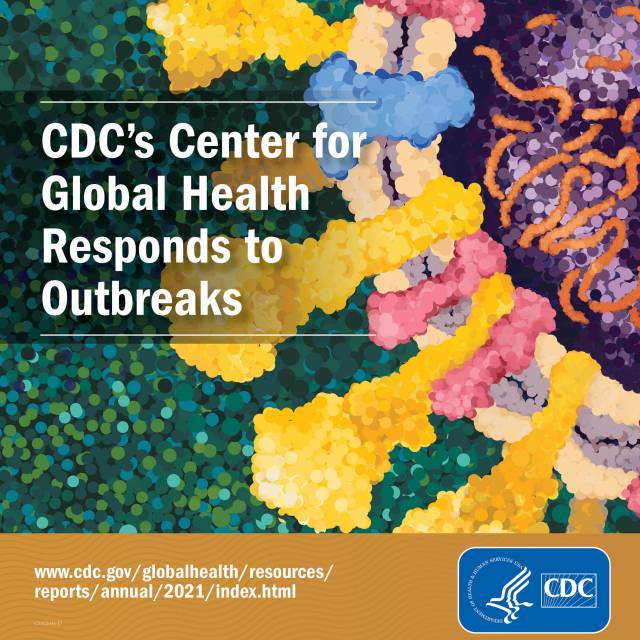You are here
New Report Highlights CDC’s Global Response Work to Protect Us All
Health threats are present everywhere, and the Centers for Disease Control and Prevention (CDC) is called upon to respond to disease outbreaks around the world. In a newly released report, CDC’s Center for Global Health (CGH) takes a deeper dive into its critical global response work, which is essential to protecting us all from dangerous health threats, including COVID-19, which has morphed into a global pandemic.
COVID-19 has killed two million people worldwide, in addition to disrupting the global economy, clearly demonstrating to the world that an infectious disease threat anywhere can become a threat everywhere. CDC’s staff deployed overseas are America’s first line of defense to protect Americans’ health when infectious disease outbreaks that erupt around the world. While CDC is laser-focused on the COVID-19 response, the work to monitor and respond to additional global health threats must continue to ensure the world is prepared for the next, inevitable outbreak. Currently, two-thirds of all countries are not prepared to respond to outbreaks and other public health emergencies.
CGH’s new report highlights recent response efforts and describes how CGH programs are adapting to the COVID-19 pandemic to continue addressing long-standing global infectious disease threats. In 2019, for instance, CGH supported more than 130 outbreak responses in nearly 90 countries, all the while helping to build global capacity for additional health threats. Responses included stopping outbreaks of Ebola, measles, cholera and yellow fever.
As part of the Global Health Security Agenda, CDC serves as the lead technical agency for developing public health workforce, surveillance, laboratory and emergency response capacities globally. Through these and other initiatives, CDC builds capacities needed to respond to existing disease outbreaks and prepare for future threats.
For over 25 years, the CDC Foundation has been supporting CDC to serve as a cross-sector convener and to build public-private partnerships to accomplish more than any one stakeholder or sector can accomplish alone. The time is now for us to leverage all sectors of society to help developing countries improve their basic public health infrastructure. This cross-sector support is needed to prevent or reduce the impact of the next pandemic.
With donor funding, the CDC Foundation over time has supported CDC’s ability to develop partner country response capacity and outbreak detection through multiple projects, many of which are highlighted in this new CGH report. Critical programs like the Field Epidemiology Training Program (FETP) in regions where CDC’s physical presence is limited have been supported.
In one example, the CDC Foundation in partnership with CDC, collaborated with the World Bank and the University of Ouagadougou to host the regional West Africa Field Epidemiology and Laboratory Training Program for the eight French-speaking countries of West Africa (Benin, Burkina Faso, Côte d’Ivoire, Guinea, Mali, Niger, Senegal and Togo). This two-year training has been adapted to a three-month frontline level. In Burkina Faso, 138 frontline fellows have graduated as of October 2018. Trainees and graduates work locally to communicate crucial information about health problems and make response recommendations.
The CDC Foundation is proud to help extend CDC’s global health preparedness and response efforts by building and sustaining global partnerships. We look forward to continuing to work together with CDC and you to make our world healthier and safer and prepared for the next threat that will inevitably arrive.
For additional information, including lessons learned and what’s next for CGH in 2021, see CDC’s Center for Global Health Responds to Outbreaks.
Photo at top of page: © Evelyn Hockstein/CDC Foundation

